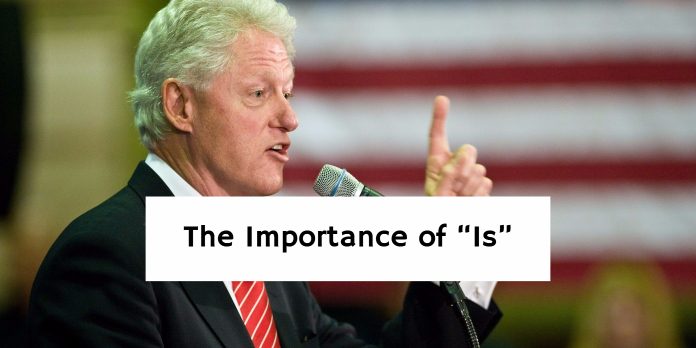I have been reading John Calvin, and in the process my thoughts have turned
briefly to Bill Clinton. In our official Reformed-Roman Catholic dialogue (which I am co-chairing on behalf of the PCUSA) we are focusing on the sacraments, and after several years on baptism we are now turning our attention to the eucharist.
When John Calvin shifted, in his lengthy discussion of the sacraments in Book Four of his Institutes, from baptism to eucharist, he immediately switched opponents. When discussing baptism Calvin argued exclusively with the Anabaptists, who rejected infant baptism; but when he focused on the eucharist his arguments were exclusively with the Roman Catholics.
Here is the Clinton connection. In a much-derided statement that the president gave during his grand jury testimony about the Monica Lewinsky affair, he offered this reply to a question: “It depends on what the meaning of the word ‘is’ is.” Given the context, Mr. Clinton deserved the derision. But in making a general point about “is” the president could have claimed John Calvin as an ally. In arguing against the Catholic doctrine of transubstantiation, Calvin spends several pages on the meaning of “is” in Christ’s statement about the bread: “This is my body.” How we understand this “copulative verb,” Calvin insists, is of utmost importance in grasping the significance of the eucharist.
My guess is that there are a number of extremely important issues in life that hang on how we understand “is.” Bill Clinton was not wrong about the importance of the question. His error was that he tried to avoid admitting guilt by raising what is in other contexts an important theological-philosophical issue.
My favorite “is” story has to do with a situation in which its removal from a sentence made all the difference in the world. In the early 1970s I was at a planning meeting in New York City. It had to do with an ecumenical project, and one of our members was the great Jesuit theologian (now a cardinal) Avery Dulles. Father Dulles reported with some irritation about a gathering of what he called “new style Catholics” he had been invited to address the previous week. When he arrived in the lecture hall, he noticed that the podium from which he was to deliver his talk had a banner hanging from it that said, “Love is God.” He told the organizers that he wanted the banner removed. “Love is God” is heretical, he said; what the banner should say is “God is Love.”
The organizers refused to remove the banner. So Father Dulles went and found a blank sheet of paper and a pin, and when he got up to speak he reached over and used the paper to block out the word “is.” Throughout the speech, then, he told us with a clear sense of spiritual satisfaction, his audience was confronted with the mandate: “Love God.”
“Is” is an important theological word–so important that sometimes our only recourse is to make it disappear!
4 Comments »
-
[…] Richard Mouw compares Clinton to Calvin Check out Richard Mouw’s (President of Fuller Theological Seminary) latest blog post. I love that in the first paragraph we have references to John Calvin, the PCUSA (as a reformed church mind you!), the Roman Catholic Church, and Bill Clinton. […]
Pingback by Richard Mouw compares Clinton to Calvin « the prime rib theory — November 27, 2007 @ 11:24 am
-
[…] That is why I absolutely LOVED Dr. Mouw’s post regarding the importance of is. If you love words or think that words are that important, please read his post. It is so amazing. I’m sure I’ll reference it for years to come in my continual battle for right (uh… correct?) words. […]
Pingback by The Daily Burns – Ryan and Jennifer Burns » Blog Archive » I like words — November 27, 2007 @ 11:53 am
-
I’ve always enjoyed the eirenic spirit in Dulles’ writings that I’ve read. It’s good to see it’s accompanied by some creative – and friendly – polemics in action.
-
I appreciate Dr. Mouw’s thoughful and humorous reflection on the importance of “is” in our theological understanding. It must be a challenge and a blessing to co-lead meetings on the sacrements (the very symbolic and meaningful acts we do claim through/by which God IS with us.) The heart of all theology does really come done to some understanding of how we understand God to “be” in our lives, in the world, and in relationship to us. How God “is” (and how we understand the nature of that “is”) determines the course of our theological belief.
I must say I appreciate the very serious (all be it funny) reaction to the incorrect sign. May we perhaps learn from his example to be careful, and always intentional with how we proclaim God to “is” – well, “be”.
 This is perhaps at the heart of our message – that we proclaim: God is love, Jesus is savior, Jesus is redeemer, Jesus is alive. We are and “is” people, as we seek to follow God. It is the reality of who God is, and what God has done, that leads up to faith.
This is perhaps at the heart of our message – that we proclaim: God is love, Jesus is savior, Jesus is redeemer, Jesus is alive. We are and “is” people, as we seek to follow God. It is the reality of who God is, and what God has done, that leads up to faith.Comment by Allison — November 29, 2007 @ 8:25 pm






























